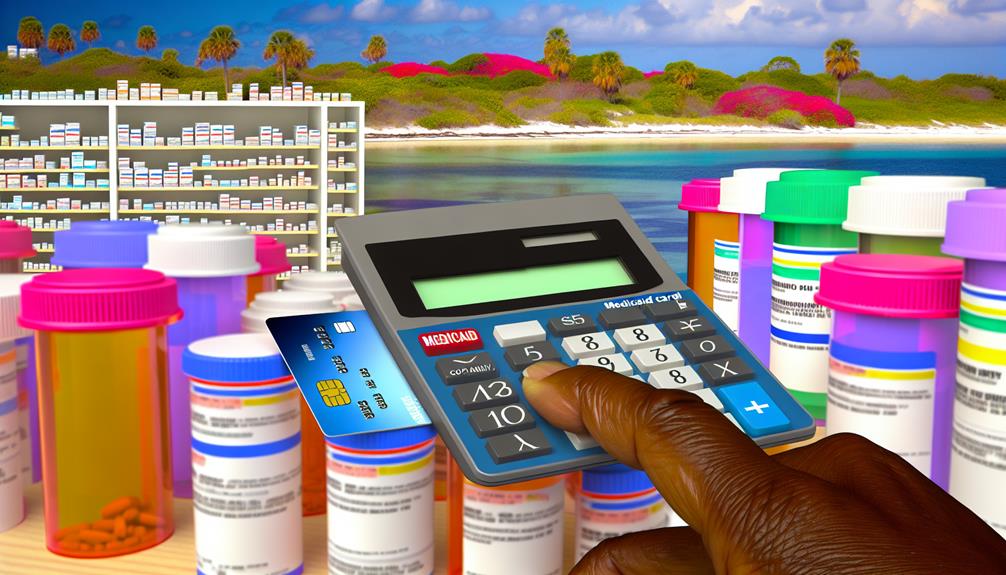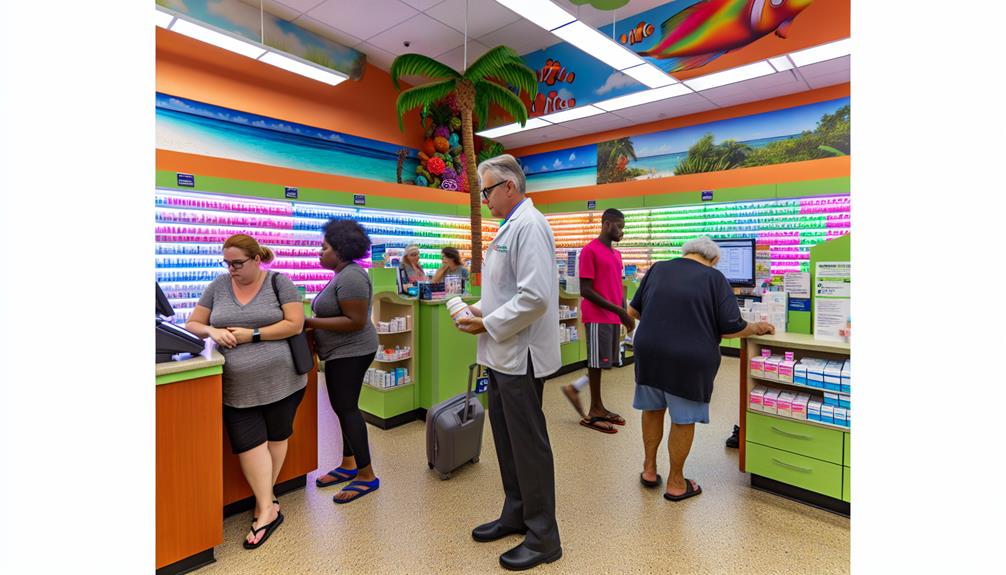Florida Medicaid offers essential prescription coverage to low-income individuals, facilitating access to necessary medications while focusing on affordability and health equity. The program covers important drug categories, including antihypertensives, antidepressants, and chronic disease medications, with both brand-name and generic options available. Eligibility is based on income, family size, and medical needs, and specific co-payment structures exist to manage costs for beneficiaries. Understanding formularies, the prior authorization process, and available pharmacy options is important for effective medication management. For more detailed insights on traversing these provisions and ensuring thorough access, exploring additional resources is advisable.
Key Takeaways
- Florida Medicaid provides essential prescription coverage for low-income individuals, promoting health equity and access to necessary medications.
- Eligibility is determined by income, family size, and specific medical needs, with special pathways for pregnant women and children.
- The program covers various essential medications, including antihypertensives, antidepressants, and antidiabetics, with both brand-name and generic options available.
- A prior authorization process ensures medications meet clinical guidelines, which may delay access to prescriptions if not properly managed.
- Beneficiaries can access in-network pharmacies and mail order services, enhancing medication adherence and optimizing health outcomes.
Overview of Florida Medicaid

Overview of Florida Medicaid
Providing necessary health coverage to millions of Floridians, Florida Medicaid is a state and federally funded program designed to assist low-income individuals and families with medical expenses. The program aims to guarantee that vulnerable populations have access to necessary healthcare services, including essential prescription benefits that alleviate the financial burden of medications. Chronic stress can negatively impact health and weaken the immune system, making access to medications even more important for maintaining overall health and well-being, especially for those managing stress-related conditions how stress affects the immune system.
Florida Medicaid encompasses a thorough array of services, tailored to meet the diverse needs of its enrollees. This includes not only hospital and physician services but also preventive care, long-term care, and mental health services. Prescription benefits under Florida Medicaid are key in promoting overall health, as they cover a wide range of medications to treat chronic conditions and acute illnesses.
The program prioritizes access to affordable prescription drugs, making certain that individuals can obtain the medications they require without incurring prohibitive costs. By facilitating access to necessary treatments, Florida Medicaid plays a significant role in enhancing the quality of life for its beneficiaries, fostering a sense of belonging within the healthcare system. Ultimately, the program reflects a commitment to health equity, working to support Floridians in their pursuit of well-being and stability.
Eligibility Requirements
Eligibility for Florida Medicaid is determined by a combination of factors, including income, family size, and specific medical needs. To qualify, applicants must meet specific income thresholds, which vary based on household size. For instance, a single individual typically must have an income at or below 138% of the federal poverty level, while larger families have higher income limits. During job changes, individuals may face emotional challenges that can affect their financial situation, making it essential to stay informed about available resources, such as navigating job changes.
In addition to income, individuals seeking Medicaid coverage must also demonstrate that they meet certain disability criteria if applying under the disability category. This may include providing medical documentation that verifies a physical or mental impairment that greatly limits one's ability to perform daily activities.
Furthermore, Florida Medicaid includes eligibility pathways for pregnant women, children, and elderly individuals, each with its own criteria and income thresholds. It is important for applicants to carefully review these requirements and gather all necessary documentation to streamline the application process. Understanding these eligibility requirements is fundamental for individuals seeking access to essential medical services and prescription coverage through Florida Medicaid, fostering a sense of belonging within the community of beneficiaries.
Types of Covered Prescriptions

Florida Medicaid covers a variety of essential drug categories that address a wide range of health needs, ensuring that beneficiaries have access to necessary medications. This coverage includes both brand-name and generic options, allowing for flexibility in treatment while also considering cost-effectiveness. It's also important to note that certain healthcare professionals, like psychiatrists and primary care doctors, can prescribe medications for anxiety, which may be covered under this plan who can prescribe anxiety medication. Understanding these categories and the distinctions between brands and generics is vital for beneficiaries to make informed choices about their prescription coverage.
Essential Drug Categories
Medicaid prescription coverage in Florida encompasses a variety of essential drug categories, ensuring that beneficiaries have access to necessary medications for managing their health. This extensive drug coverage is designed to address a wide range of medical conditions, enhancing medication access for individuals who might otherwise struggle to afford prescription drugs.
Key categories under Florida Medicaid include antihypertensives, which assist in managing blood pressure; antidepressants, providing critical support for mental health; and antidiabetics, essential for individuals living with diabetes. Additionally, medications for asthma and other respiratory conditions are covered, highlighting the importance of respiratory health.
Furthermore, medications for chronic diseases, such as arthritis and heart disease, are included, recognizing the need for long-term treatment options. The program also addresses the needs of vulnerable populations, including children and the elderly, by including pediatric formulations and geriatric dosages.
Brand vs. Generic Options
The distinction between brand-name and generic medications plays a crucial role in the prescription coverage landscape under Florida Medicaid. Understanding these options is essential for beneficiaries seeking effective treatments while managing costs. Brand-name medications are typically developed by pharmaceutical companies, characterized by their brand effectiveness, which is often supported by extensive research and marketing. In contrast, generic medications are equivalent in dosage, safety, and efficacy but are usually available at a considerably lower price, providing substantial generic savings.
Key considerations regarding brand and generic options include:
- Cost Implications: Generic drugs often cost less than their brand-name counterparts, making them more accessible for Medicaid beneficiaries.
- Therapeutic Equivalence: Both categories must meet the same rigorous standards set by the FDA, ensuring that generics are just as effective.
- Availability: Some medications may only be available as brand-name options, limiting choices for patients.
- Patient Preferences: Individual responses to medications can vary, and some patients may prefer the brand version for perceived effectiveness.
Ultimately, understanding these distinctions can empower beneficiaries to make informed choices regarding their health care.
Understanding Formularies
Formularies serve as vital tools in managing prescription coverage, outlining the specific medications that an insurance plan, such as Florida Medicaid, will cover. These lists categorize drugs into various classifications, helping healthcare providers and patients navigate what is available under their coverage. Understanding how formularies work is important for maximizing benefits and ensuring access to necessary medications. Additionally, effective strategies for managing health challenges can greatly enhance a patient's ability to cope with any related emotional distress navigating emotional challenges.
Florida Medicaid regularly implements formulary updates, reflecting the latest clinical evidence and cost-effectiveness analyses. These updates can lead to changes in the availability of certain medications, which may impact treatment plans for individuals relying on Medicaid for their prescriptions. It is important for beneficiaries to stay informed about these changes to avoid unexpected obstacles in medication access.
Drug classifications within the formulary determine how medications are grouped, often based on therapeutic use or chemical composition. This organization aids in simplifying the prescribing process for healthcare providers while ensuring that patients receive appropriate treatments. Ultimately, understanding Florida Medicaid's formulary structure empowers beneficiaries to engage actively in their healthcare decisions, fostering a sense of belonging within the healthcare system and promoting better health outcomes.
Co-Payment Structures

Co-payment structures play an essential role in determining the out-of-pocket expenses for Florida Medicaid beneficiaries when obtaining prescription medications. These structures are designed to balance accessibility to necessary medications while managing program costs, similar to how self-awareness and empathy contribute to personal growth in other contexts. Understanding the components of co-payment structures is important for beneficiaries to navigate their healthcare expenses effectively.
Key elements of Florida Medicaid co-payment structures include:
- Co-payment Limits: Florida Medicaid sets specific maximum amounts that beneficiaries are required to pay, ensuring that costs remain manageable.
- Co-payment Exemptions: Certain populations, such as children, pregnant women, or individuals receiving hospice care, may qualify for exemptions from co-payments entirely.
- Tiered Co-payment System: Medications are often categorized into tiers, with varying co-payment amounts based on the tier's placement and the medication's necessity.
- Annual Changes: Co-payment amounts and limits may be subject to annual revisions, necessitating beneficiaries to stay informed about any updates that could affect their financial responsibilities.
Prior Authorization Process
Prior authorization is a critical component of the Florida Medicaid prescription coverage process, impacting a substantial number of medication requests. This process serves to guarantee that prescribed medications align with established clinical guidelines, which help to maintain the integrity and efficiency of the healthcare system. By requiring prior authorization, Florida Medicaid aims to promote appropriate medication use while curbing unnecessary costs associated with ineffective or inappropriate therapies.
The prior authorization process typically involves healthcare providers submitting requests to the Medicaid program on behalf of their patients. These requests must include detailed information about the patient's medical history, the prescribed medication, and the rationale for its necessity. The review team evaluates the submission against clinical guidelines to determine whether the medication is both medically necessary and appropriate for the patient's specific condition.
While this process can sometimes introduce delays in accessing medications, it also fosters a collaborative approach between providers and the Medicaid program. Ultimately, the goal is to guarantee that beneficiaries receive the most effective treatments while adhering to established standards of care. Understanding the prior authorization process is essential for both healthcare providers and patients maneuvering Florida Medicaid prescription coverage.
Pharmacy Options

Florida Medicaid offers various pharmacy options to meet the diverse needs of its beneficiaries. These options include in-network pharmacies, mail order services for convenience, and specialty drug providers for complex health conditions. Understanding these alternatives is essential for optimizing prescription coverage and ensuring access to necessary medications.
In-Network Pharmacies
Maneuvering the array of in-network pharmacies is essential for beneficiaries seeking to maximize their Florida Medicaid prescription coverage. Understanding which in-network locations are available can notably impact both access to medications and overall healthcare costs. Florida Medicaid pharmacy networks are designed to provide a broad selection of pharmacies, guaranteeing that beneficiaries can find convenient options for their prescription needs.
When evaluating in-network pharmacies, consider the following factors:
- Geographic Accessibility: Verify the pharmacy is conveniently located to reduce travel time and improve adherence to medication schedules.
- Medication Availability: Confirm that your prescribed medications are in stock at the chosen pharmacy to avoid delays in treatment.
- Pharmacy Services: Evaluate additional services offered, such as medication counseling or synchronization programs, which can enhance the overall pharmacy experience.
- Customer Support: Look for pharmacies with dedicated staff who can assist with prescription questions and provide personalized care.
Mail Order Services
Exploring mail order services can offer Florida Medicaid beneficiaries a convenient alternative for managing their prescription medications. This option enhances mail order efficiency by providing a streamlined process for obtaining medications without the need for in-person visits to a pharmacy. Beneficiaries can have their prescriptions filled and delivered directly to their homes, which is particularly beneficial for those with mobility challenges or those who live in remote areas.
Moreover, mail order services typically feature predictable delivery timelines, ensuring that patients receive their medications on time. This reliability is essential for individuals on long-term medication regimens, as it supports adherence to treatment plans and can improve overall health outcomes.
Additionally, many mail order pharmacies offer a wider array of medications than local pharmacies, including generic options that can be more cost-effective. With the convenience of online ordering and the ability to manage refills through user-friendly platforms, Florida Medicaid beneficiaries can enjoy a sense of control over their healthcare.
Specialty Drug Providers
For beneficiaries managing complex health conditions requiring specialized medications, the role of specialty drug providers becomes increasingly significant. These providers facilitate specialty drug access through specialized pharmacy networks, ensuring that patients receive the necessary therapies tailored to their unique health needs. Specialty pharmacies are equipped with the knowledge and resources to handle high-cost, complex medications, often requiring specific handling and administration.
Key aspects of specialty drug providers include:
- Expert Consultation: Pharmacists with specialized training offer guidance on medication management and adherence.
- Care Coordination: These providers work closely with healthcare teams to streamline treatment plans and monitor patient progress.
- Patient Support Programs: Many specialty pharmacies offer additional resources, including financial assistance and educational materials tailored to each patient's condition.
- Insurance Navigation: They assist beneficiaries in understanding their coverage options and ensuring that prescribed medications are covered under Florida Medicaid.
Medication Management
Effective medication management is essential for ensuring ideal health outcomes among Florida Medicaid recipients. This process involves coordinating and optimizing medication regimens to enhance medication adherence, particularly for individuals managing chronic conditions such as diabetes, hypertension, and asthma. Without proper management, medication non-adherence can lead to severe health complications, increased hospitalizations, and ultimately, higher healthcare costs.
A robust medication management program encompasses several key components. First, it includes thorough medication reviews conducted by healthcare providers to assess the appropriateness of prescribed medications, dosages, and potential interactions. Additionally, patient education is vital, empowering individuals to understand their treatment plans and the importance of adhering to prescribed regimens.
Moreover, leveraging technology, such as medication reminders and digital health applications, can greatly improve adherence rates. Building a sense of community support through counseling and peer interactions also fosters a supportive environment that encourages individuals to actively participate in their health management.
Ultimately, effective medication management not only enhances the quality of life for Florida Medicaid recipients but also promotes a healthier, more engaged community, aligning with the broader goals of healthcare accessibility and equity.
Appeals Process

Maneuvering the appeals process is a critical component of Florida Medicaid's prescription coverage system, guaranteeing that recipients have the opportunity to contest decisions related to their medication benefits. Understanding the intricacies of this process is essential for beneficiaries who may feel overwhelmed or discouraged.
To initiate an appeal, recipients must adhere to specific appeal timelines and documentation requirements. These guidelines are designed to guarantee that every request is processed efficiently and fairly. Key elements include:
- Timely Submission: Appeals must be filed within a designated timeframe after a denial notice is received.
- Required Documentation: Thorough documentation, including medical records and previous prescriptions, must accompany the appeal to substantiate the request.
- Clear Justification: Beneficiaries should clearly articulate why the appealed decision should be reconsidered, focusing on medical necessity and coverage criteria.
- Follow-Up: Regularly checking the status of the appeal can help recipients stay informed and engaged throughout the process.
Resources for Assistance
Frequently, beneficiaries of Florida Medicaid may find themselves needing additional support as they maneuver through the complexities of prescription coverage. Understanding the available resources can greatly enhance their experience and guarantee they receive the necessary medications.
Community resources play an essential role in assisting individuals with their prescription needs. Local non-profit organizations and health clinics often provide guidance on maneuvering through Medicaid benefits, as well as information on eligibility for additional programs. These organizations can help beneficiaries understand their rights and options, facilitating access to necessary medications.
In addition to community support, online assistance is increasingly available. Websites such as the Florida Medicaid portal offer extensive information about benefits, coverage options, and application processes. Beneficiaries can also access online forums and support groups that connect them with others facing similar challenges, fostering a sense of belonging and shared experience.
Utilizing both community resources and online assistance can empower Florida Medicaid beneficiaries, guaranteeing they have the tools and information necessary to effectively manage their prescription coverage. By leveraging these resources, individuals can maneuver through the complexities of their healthcare with greater confidence and support.
Frequently Asked Questions
Can I Use Florida Medicaid for Out-Of-State Prescriptions?
Using Florida Medicaid for out-of-state prescriptions presents specific challenges regarding prescription eligibility. Typically, Medicaid programs are state-specific, which can limit out-of-state access to medications. However, certain exceptions may apply, particularly in emergencies or when traveling. It's essential for beneficiaries to consult their local Medicaid office to understand the nuances of their coverage when seeking prescriptions outside Florida, ensuring adherence to regulations and maximizing access to necessary medications while away from home.
Are There Specific Pharmacies for Florida Medicaid Members?
Florida Medicaid members are typically required to use specific pharmacy networks for their prescription needs. These networks are designed to facilitate effective medication management, ensuring that members receive appropriate medications while adhering to coverage guidelines. Utilizing designated pharmacies allows for streamlined processes in claims and refills, promoting a cohesive healthcare experience. It is advisable for members to familiarize themselves with their local pharmacy options within the network to optimize their benefits and access to medications.
How Are Prescription Limits Determined in Florida Medicaid?
Prescription limits in Florida Medicaid are determined through a structured prescription management system that adheres to established coverage criteria. These criteria guarantee that prescribed medications align with clinical guidelines and the patient's medical necessity. Factors influencing limits include the type of medication, treatment protocols, and potential for misuse. By implementing these standards, Florida Medicaid aims to optimize patient care while managing costs effectively, guaranteeing that members receive appropriate and necessary prescriptions.
What if My Medication Is Not on the Formulary?
If your medication is not listed on the formulary, you may pursue formulary exceptions. This process often requires prior authorization, where healthcare providers submit documentation justifying the need for the non-formulary medication. Engaging in this process helps guarantee that patients receive necessary treatments while adhering to Medicaid guidelines. It's crucial to communicate effectively with your healthcare provider to facilitate the approval of alternative medications that may better suit your medical needs.
How Often Can I Refill My Prescriptions With Florida Medicaid?
In Florida Medicaid, refill frequency for prescriptions typically adheres to specific prescription limits established by the program. Generally, medications can be refilled once the initial supply has been consumed, which is often within a 30-day period. However, certain medications may have stricter guidelines or restrictions. It is crucial to consult with your healthcare provider or pharmacist to guarantee compliance with these regulations and to address any unique circumstances related to your prescription needs.





